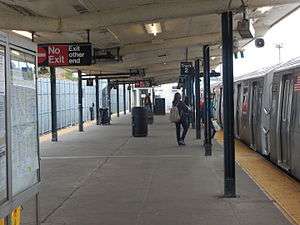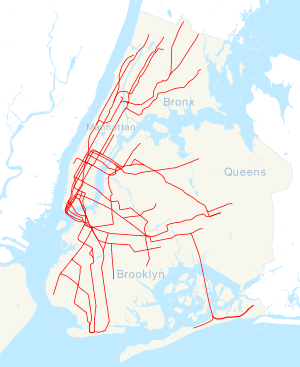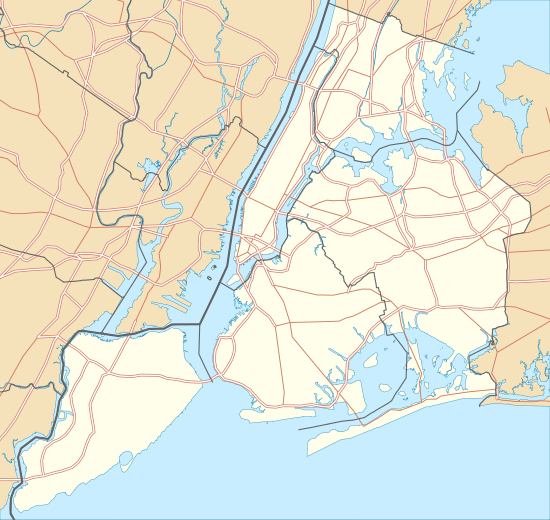Canarsie–Rockaway Parkway (BMT Canarsie Line)
Canarsie–Rockaway Parkway | |||||||
|---|---|---|---|---|---|---|---|
|
| |||||||
|
Station house | |||||||
| Station statistics | |||||||
| Address |
Rockaway Parkway & Glenwood Road Brooklyn, NY 11236 | ||||||
| Borough | Brooklyn | ||||||
| Locale | Canarsie | ||||||
| Coordinates | 40°38′43″N 73°54′09″W / 40.645382°N 73.902626°WCoordinates: 40°38′43″N 73°54′09″W / 40.645382°N 73.902626°W | ||||||
| Division | B (BMT) | ||||||
| Line | BMT Canarsie Line | ||||||
| Services |
L | ||||||
| Transit connections |
| ||||||
| Structure | At-grade | ||||||
| Platforms | 1 island platform | ||||||
| Tracks | 2 | ||||||
| Other information | |||||||
| Opened | December 28, 1906 | ||||||
| Station code | 138[1] | ||||||
| Accessible |
| ||||||
| Traffic | |||||||
| Passengers (2017) |
1,201,452[2] | ||||||
| Rank | 133 out of 425 | ||||||
| Station succession | |||||||
| Next north |
East 105th Street: L | ||||||
| Next south |
(Terminal): L | ||||||
|
| |||||||
| Next |
Wilson Avenue: L | ||||||
| Next |
none: L | ||||||
| |||||||
| |||||||
| |||||||
Canarsie–Rockaway Parkway is the southern terminal station of the BMT Canarsie Line of the New York City Subway, and is one of the few grade-level stations in the system. Located at the intersection of Rockaway Parkway and Glenwood Road in the Canarsie neighborhood of Brooklyn,[3] it is served by the L train at all times.[4]
Station layout
| Ground/platform level Exit/Entrance via headhouse; Fare control, station agent, MetroCard Vending Machines |
Track 1 | |
| Island platform, doors will open on the left, right | ||
| Track 2 | ||
| Bus loops and free transfer to B42 | ||

This grade level station, opened on December 28, 1906, has two tracks and a single island platform. The two tracks end at offset bumper blocks at the south end of the station; track 2, the northbound track, is slightly shorter than track 1 because of the diagonal alignment of the station to the street grid.[5][6]
Because it is at street level, the station is accessible as part of the Americans with Disabilities Act of 1990.[7] However, this station is planned to be upgraded with several ADA improvements to be added in the near future,[8] since the station is still missing some key ADA elements.[7] The final components of ADA accessibility at the station will be completed as part of the 2015–2019 MTA Capital Program. The station agent booths will be relocated, platforms will have boarding areas extended and would have warning strips and rubbing boards, the platform gaps would be reduced, and a new ADA compliant ramp will be installed, along with other modifications, for $5.48 million.[9][7]
Adjacent to the station to the east is the Canarsie Yard.[5][6]
Exits
The station's entrance is beyond the bumper blocks at the south end of the platform. It contains a turnstile bank, token booth, and leads to Rockaway Parkway. On the side of the station house opposite the transfer point is a secondary entrance/exit that contains one HEET entry/exit turnstile, one exit-only HEET turnstile, and one emergency gate. This unstaffed entrance/exit leads to a NYCDOT municipal parking lot, located on the north side of the station. This lot was opened by the New York City Transit Authority in 1959, with space for 340 cars.[10][11] Another set of HEET turnstiles between the north end of the bus loop and Canarsie Yard connected to the platform by a passageway leads to East 98th Street near Glenwood Road.
Bus transfer
This station is the only one in the system with a bus transfer station within fare control. When the rail service to Canarsie Pier along Rockaway Parkway was discontinued, riders were entitled to a free transfer to the replacement trolleys. Rather than issue paper transfers so riders could exit to the street for the trolleys, a loop was built next to the station with a boarding platform. When the trolleys were discontinued in April 1949, the B42 bus replaced them.[12] South of here, there are still trolley poles remaining, with street lighting using some of them.[13]
Train riders walk directly to the bus loading area without leaving the fare control zone. In turn, bus passengers from Rockaway Parkway enter the subway station without paying an additional fare. At the street, a chain link fence gate blocks access to the bus area to prevent pedestrians from sneaking in for a free ride. The gate is operated by an electric trigger, and was put into operation on December 7, 1960.[12] The back of the bus loop contains an unstaffed entrance to the Rockaway Parkway station that is built on a small shack, has one HEET turnstile, one exit-only turnstile, and one emergency gate, and leads to the northeast corner of Glenwood Road and East 98th Street.
Other buses serving the station stop at the curb and pick up passengers outside fare control on the East 98th Street loop outside the inner loop. A chain link fence separates the loops.
As part of the 2015–2019 MTA Capital Program, a bus boarding island that meets ADA curb height standards, as well as additional modifications, will be constructed for $2.40 million.[9]
References
- ↑ "Station Developers' Information". Metropolitan Transportation Authority. Retrieved June 13, 2017.
- ↑ "Facts and Figures: Annual Subway Ridership 2012–2017". Metropolitan Transportation Authority. July 12, 2018. Retrieved July 12, 2018.
- ↑ "Neighborhood Map Brownsville Ocean Hill East New York Remsen Village" (PDF). mta.info. Metropolitan Transportation Authority. 2015. Retrieved October 2, 2016.
- ↑ "L Subway Timetable, Effective June 24, 2018" (PDF). Metropolitan Transportation Authority. Retrieved June 24, 2018.
- 1 2 "General Station Arrangement Sta. 79+00 TO 96+60 14th Street Canarsie Line P BMT". bmt-lines.com. New York City Transit Authority Maintenance of Way Department Signal Section. November 17, 1965. Retrieved August 10, 2016.
- 1 2 Dougherty, Peter (2006) [2002]. Tracks of the New York City Subway 2006 (3rd ed.). Dougherty. OCLC 49777633 – via Google Books.
- 1 2 3 "Access excess? MTA spending $6M to make stairless station handicapped accessible". Brooklyn Daily. 2017-07-07. Retrieved 2018-03-08.
- ↑ "MTA Capital Program 2016-2019: Renew. Enhance. Expand" (PDF). Metropolitan Transportation Authority. October 28, 2015. Retrieved October 28, 2015.
- 1 2 "METROPOLITAN TRANSPORTATION AUTHORITY (MTA) NOTICE OF PUBLIC HEARING AND DESCRIPTION OF PROJECTS Tuesday, August 23, 2016 4:30 P.M. Request for Federal Financial Assistance Under the Federal Transportation Authorization For Federal Fiscal Year 2017 Capital Improvement Projects" (PDF). mta.info. Metropolitan Transportation Authority. July 28, 2016. Retrieved August 7, 2016.
- ↑ "Municipal Parking Facilities". New York City Department of Transportation.
- ↑ Stengren, Bernard (August 15, 1959). "City Lots Provide 10,850 Car Spaces" (PDF). The New York Times. Retrieved September 6, 2016.
- 1 2 Muir, Hugh G. (December 7, 1960). "Sonic 'Echo' Unit Stands Guard For Subway-Bus Transfer". New York World-Telegram. Fultonhistory.com. pp. B1, B3.
- ↑ "CANARSIE'S BACKYARD TROLLEY - Forgotten New York". forgotten-ny.com. Retrieved August 10, 2016.
External links
| Wikimedia Commons has media related to Canarsie – Rockaway Parkway (BMT Canarsie Line). |



